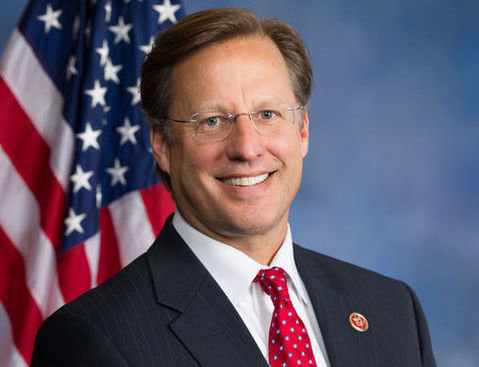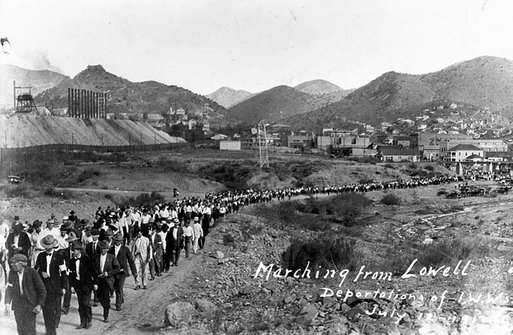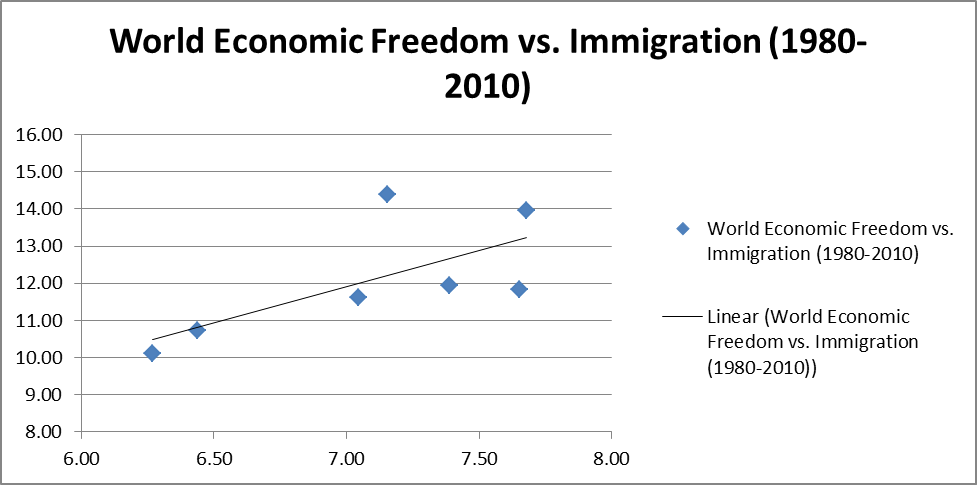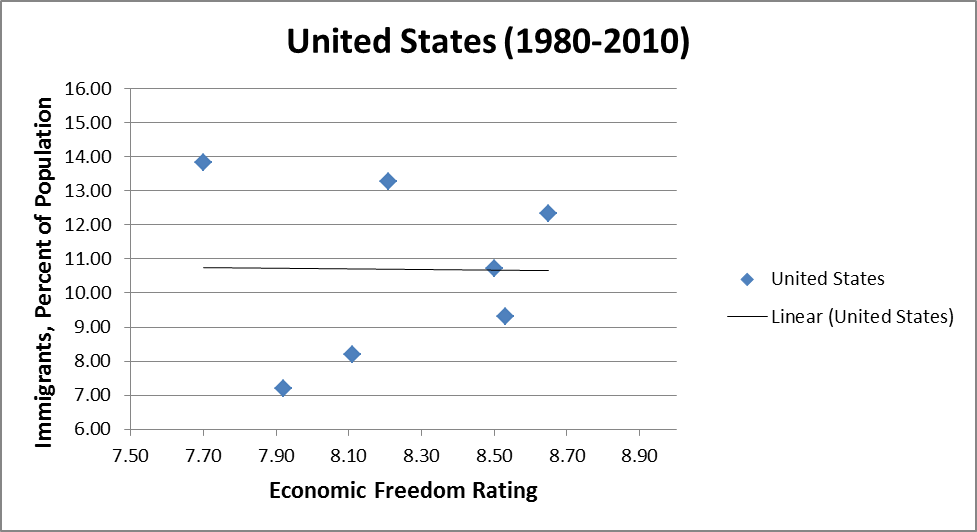I live in Virginia, where unknown challenger David Brat just recently made US national news as a political giant-killer, toppling Eric Cantor from his Congressional seat and running on a vehemently anti-immigration, anti-open borders campaign. Cantor was widely seen as a strong candidate for next Speaker of the House of Representatives, and his loss was a huge shock to the US political establishment. A lot of ink’s been spilled on this, but I want to focus specifically on the libertarian response to Brat’s unexpected victory.
Brat teaches economics at Randolph-Macon College in Virginia, and generally describes himself both as a strong Christian and an adherent of Ayn Rand, a very influential thinker in the libertarian movement. He makes a lot of strong nods to libertarianism in his political rhetoric, although I’m unclear whether he self-identifies as libertarian.
Either way, I honestly don’t care that much about the outcome of this election: I have never liked Cantor, and although he has made some welcome limited moves towards amnesty for some irregular immigrants, he has basically been more pro-closed borders than many others in the political establishment (which says something). It is pretty amazing that Brat campaigned in part on the basis of alleging that Cantor supports open borders, and disappointing that Brat won, but it’s unclear how far his victory reflects voters’ stance on immigration or other policy areas, versus their general distaste for Cantor as a politician and legislator. I wouldn’t even bother to comment on this brouhaha, if not for how libertarians on the internet seem to be reacting to Brat’s win.
Now, full credit to the various libertarian analysts I’ve seen writing about Brat on immigration — virtually all of them dismiss his closed borders stance as inconsistent with libertarianism:
- Jacob Levy at Bleeding Heart Libertarians cited Brat’s win as a reason why he’s skeptical of the libertarian movement’s flirtation with the right wing
- Steve Landsburg pointedly noted all the incoherencies in Brat’s claim to support free markets, while opposing labour mobility
- Donald Boudreaux at the libertarian blog Cafe Hayek used Brat as a jumping-off point to discuss again his frustration with libertarians who reject open borders
- Suzanne Schaefer at Students for Liberty, a libertarian advocacy group, asked libertarians to be skeptical about Brat’s win being a political win for their cause
- Our guest blogger Alex Nowrasteh at the Cato Institute explained how the border controls Brat favours are inconsistent with the free market he supports
But reading through the reader comments on all these pieces, one cannot help but be struck at the amazing number of self-identified libertarians who are not just skeptical of open borders but outright opposed to it. If they support Brat for his alignment with Christian ideals or Randian thought, perhaps they ought to be aware that to the extent the Bible speaks about borders, it actually advocates for immigrant rights and the human right to migration (see our blog posts tagged Christianity), and that Rand was “indignant” at the idea of opposing open borders.
Although my personal policy stances (not just on immigration) tend to lean libertarian, like some other libertarian-leaners I have some skepticism about identifying as libertarian — in part because of the paleoconservative right-wingers who seem to occupy a disproportionate space in the libertarian movement. Either way, I lean libertarian, and so I feel somewhat obligated to engage with the idea that opposing open borders is consistent with the ideas of libertarianism.
In my view, it is impossible for a consistent libertarian to oppose open borders. One of the fundamental tenets of classical liberalism, which has been adopted (at least in name) by most of its descendants — including modern left liberalism and modern libertarianism — is respect for the individual’s rights and dignity. Prohibiting individuals from moving freely is a prima facie violation of these individuals’ rights. Now, in some or many cases, violating these individuals’ rights may be justified. But what sort of justifications can we provide that would be acceptable to libertarians?
The libertarian case for open borders hinges on the opinion — though I am tempted to call it fact — that you cannot justify arbitrary restrictions on the movement of individual people without resorting to fundamentally illiberal excuses which (to a libertarian) unjustly put the interests of the government or state ahead of the rights of the individual. From a libertarian standpoint, most — if not all — arguments for restricting the movement of individuals who have committed no crime against any identifiable victim simply boil down to collectivism, totalitarianism, or both.
On our site, we list out some common retorts to the libertarian case for open borders. They are:
- Enforcement of border controls is not a form of government action, and should be viewed instead as a form of government inaction
- Because governments are obligated to put the interests of their citizens above all else (a view sometimes called citizenism), they must prioritise the interests of citizens over the liberty of non-citizens
- The people of a state have a collective property right over their state’s territory which grants the state’s government a moral authority or right to arbitrarily exclude any foreigner that the polity sees fit to exclude
- That in an anarcho-libertarian world, many individual landowners would be able to and would in actuality exclude immigrants from their land, and therefore in a second-best world with government, governments must similarly exclude immigrants
True enough, virtually every one of these rationales for ostensibly-principled libertarian opposition to open borders has appeared in the reader comments section of the libertarian analyses I mentioned earlier. So let’s dissect them each in turn:
- Are states literally spending billions of dollars to do nothing? The barbed wire fences we build and gunships which our governments deploy in our name are surely meant to do more than just sit around and look pretty. It seems almost intentionally obtuse to deny that these things are meant to serve an active, violent purpose.
- There are many reasons to be skeptical of the citizenist worldview (or at least its most strong form), but to a libertarian, surely it’s relevant that citizenism outright declares that the interests (not just rights) of some individuals are more important than others’ rights. Sure, you can argue that a fundamental tenet of citizenism is that some people just aren’t entitled to certain rights, but you’re just shifting the goalposts: you can’t justify restrictions on individual movement of non-citizens without resorting to a literally collectivist worldview that says “citizens” are a collective whose interests supersede the rights of individuals that don’t belong to the citizens’ collective.
- The “collective property rights” argument literally has the word “collective” in its name. You can’t dress this up with liberal sprinklings of the phrase “property rights”. In the end, you’re still saying that a collective should be allowed to supersede the rights of individuals.
- First, I’m not sure the anarcho-capitalist counterfactual is all that compelling to libertarians who embrace minarchism or basically any non-anarchist approach. But even if it is, you can imagine a counterfactual world where many private property owners are happy to build a road and allow anyone to travel on it, whether for free or for a toll, and therefore bypass those landowners less amenable to immigration (if such a concept as “immigration” could even exist in a world with literally no borders). Libertarians who espouse this counterfactual also often take for granted that individual landowners could easily choose to ban natives, not just foreigners, from their lands. Consistent libertarians who take this idea seriously should agitate for stronger mobility controls over other citizens too, to preserve their property rights ostensibly implied by this counterfactual. In light of all this, why should my open borders counterfactual — one which also happens to more closely resemble the real world, with its actual roads built on the common law concept of right-of-way — be any less compelling than this strange hypothetical world?
You may not be a libertarian and find all of this irrelevant navel-gazing, if not possibly counter to your actual views. If so, sorry, but as is hopefully clear, these arguments aren’t aimed at non-libertarians. There are plenty of non-libertarian or non-libertarian-specific reasons to favour open borders and indeed to characterise open borders as a fundamental human right — I’m just intentionally not getting into them because I think the libertarian case for open borders ought to be compelling enough for libertarians.
Now, obviously a decent number of self-identified libertarians are able to reconcile their opposition to open borders with their proclaimed respect for individual rights. I think in general they do this by compromising a little and saying that collectives such as nations or states do have some rights (in some cases, such libertarians have explicitly made this part of their rationale).
Some libertarians no doubt will be tempted to right away dismiss these people as traitors to the libertarian cause. While yes, these people are surely no anarcho-libertarians, on the face of it they don’t seem to me all that different from libertarian minarchists or even other centre-leaning libertarians (such as, most famously, Milton Friedman and Friedrich Hayek, both of whom seemed content to accept the state even though this obviously necessitated some compromises on individual vs collective rights).
But saying that a collective has rights does not tell us what the collective is allowed to do — what its rights are, or how it may exercise those rights. I contend that a collective entity such as the state simply lacks the authority to forcibly exclude anyone, citizen or not, from its territory or jurisdiction on the basis of arbitrary reasons. Individuals may delegate collective authority to legislate to the government of a state, but that does not give the government a justifiable reason to arbitrarily exclude people whose last name starts with the letter Z, or people who have a freckle on their chin. It certainly does not give the government a justifiable reason to arbitrarily exclude people because of their race or sex or even sexual orientation.
I simply go one step further to say that place of birth should also be up there on that list of intolerably arbitrary criteria. I am not saying that your place of birth is irrelevant to who you are. It is no less relevant to who you are than your sex, your race, or a whole host of other things about you. I am simply saying that as far as the government is concerned, these conditions of birth should not be any of its business when it comes to deciding who it can exclude.
Now you can protest my general statement that governments cannot justifiably exclude people in an arbitrary manner — in which case you seem to be endorsing government exclusion of people on the basis of race, sex, and a whole bunch of other things, which in general is repugnant to libertarianism (a vocal racist fringe who self-identify as libertarian notwithstanding). But more likely you’ll protest my specific statement that exclusion of foreigners is arbitrary.
Now it’s certainly true that foreigners are different from citizens in a whole bunch of ways. They often grow up speaking a different language and operating under a different set of institutions. But our own citizens also grow up in a variety of communities, institutions, and backgrounds. Why do we treat citizens as morally non-excludable, and foreigners as excludable?
The objection seems to be that foreigners are fundamentally different from citizens. But why should this matter to a libertarian? If foreigners agree to respect the state’s laws, then they don’t harm any citizens and certainly don’t harm the state. If foreigners run afoul of the state’s laws, then the state may exclude them. The state certainly has no compunctions about excluding citizens who violate its laws, although it typically excludes them from society by jailing them instead of deporting them.
Perhaps anti-open borders libertarians worry that foreigners’ promise to respect the laws can’t be trusted. But judging from what they’ve written on this issue, it seems the clear theme is this: foreigners will respect the law, and that’s the problem. To be specific, they’ll obtain welfare as provided for by the state’s laws, and as Milton Friedman supposedly told us, society will literally collapse as a result.
To these libertarians, the claim that open borders and a welfare state are not compatible is a self-proving result; it also often seems to self-axiomatically lead to the conclusion that a welfare state which opens its borders will collapse into violence and disorder. Now, Friedman never stated that a welfare state with open borders would collapse into violence, so that second half seems completely suspect to me. But even so, it seems to me that libertarians are also completely taking for granted that Friedman must have been right when he declared this fundamental incompatibility.
The biggest reason Friedman was wrong is simple: welfare states generally do not determine who has access to their benefits simply on the basis of who is present on their territory or in their jurisdiction. There is almost always a whole bunch of paperwork you have to fill out to get your benefits, which is how the government makes sure you’re eligible. You can’t just show up and say “I’m a warm body, so give me my benefits!”
You might argue discrimination in benefits access isn’t an implementable public policy. But virtually every welfare state you can think of, even the most generous ones, already curtail foreigners’ and/or immigrants’ access to welfare benefits in some way. So it’s not impossible; it’s already being done. Americans often seem to forget that part of Bill Clinton’s sweeping welfare reforms included stricter eligibility criteria for immigrant access to federal benefits.
You might say that our insistence that the government refrain from arbitrarily excluding people inevitably forces us to open benefits access to anyone irrespective of birth condition. But this confuses two very different things: under the collectivist principles we’ve been taking for granted, governments have the authority to exclude some people from society, and they also have the authority to subsidise some people. These two things are separate. The criteria you use to decide who to exclude don’t have to be the criteria you use to decide who to subsidise.
Exclusion is a matter of fundamental justice; abuse of the state’s power to exclude is a violation of the fundamental human right to associate with other people. Fundamentally everyone agrees the state exists to provide criminal and civil justice services — failure to provide these in a just and fair manner is unconscionable. Subsidies on the other hand are a matter of redistributive justice or compassion. Yes, these are things which many if not most libertarians reject as any reasonable basis for government policy — but if we’re taking the welfare state as a given, we are still taking as a given that the principles under which welfare benefits get doled out may and ought to differ from the principles under which we decide who to criminally punish and exclude.
So Milton Friedman was just wrong here: the welfare state does not fundamentally require border controls to limit access to benefits. The welfare state already has access to documentary evidence which it uses to determine eligibility. It is not just strange to insist that the police-military state be allowed to violently exclude people for the sake of protecting a limited pool of welfare benefits; it is completely unnecessary. The welfare state doesn’t need you to violently exclude anyone, because it already has its own process for checking people’s papers to confirm eligibility for benefits.
Grasping for straws, anti-open borders libertarians finally reach for perhaps the least libertarianism-compatible of all objections so far: the claim that immigrants will implement or encourage citizens to implement more statist policies, such as an expansion of the welfare state, and that to protect what little libertarian policies are left, it is imperative for libertarians to support the exclusion of immigrants. This argument is so patently unjust and transparently unlibertarian that I am amazed anyone can make it and call themselves libertarian with a straight face.
Let’s take for granted the questionable empirical claim that immigration leads to an expansion of the state’s power over individuals. How does this justify restricting immigration, without also justifying a whole host of other unjust exclusionary policies?
After all, besides immigrants, you can think of a whole bunch of other demographic groups who seem inclined to oppose libertarianism: in the US context, these include people like blacks, women, perhaps Jews. Why shouldn’t libertarians support policies that exclude these people too? You know what: allowing blacks to eat means that there’ll still be blacks around to oppose libertarian policies. Therefore, a good American libertarian should support policies that restrict the sale of food to African-Americans. Force the state to starve the statists, and ensure a brighter future for liberty!
You will surely object: hey, libertarians should oppose policies that unjustly exclude citizens, but libertarians may and should support the exclusion of non-citizens who hold the wrong political beliefs. But what rationale do you have for holding non-citizens’ rights to a different bar? Now we go back to all the rationales you cited earlier: collective property rights, bla bla bla. But it sure seems to me like your whole project to erect an edifice of libertarian arguments for closing the borders is actually tearing down liberty, not building it up: if you’re so willing to make compromises on the liberty of people who’ve committed no crime other than being born in the wrong place, or thinking the wrong way, it’s questionable whether you’re committed to the liberty of anyone else at all.
Let’s say you’re all right with the idea that libertarians shouldn’t oppose open borders, but still find it a self-defeating political strategy to “eat your own” when it comes to the likes of David Brat. After all, when there’s someone saying the right things about markets and all freedom and all those things libertarians love, but also saying the wrong things about some other things, is it fair to criticise him? Especially when he’s doing well in the polls and might make a real political splash?
I am not all that qualified to pontificate on the political ramifications here, but let’s focus on whether support of open borders should be a top consideration in assessing someone’s libertarian credentials. From our discussion here, it seems to me that any libertarian who opposes open borders either has some serious missteps in their thinking, or simply rejects, in very large part, libertarianism’s ostensible commitment to the rights and dignity of the individual. Libertarians who oppose open borders simply should not exist; either you favour open borders, or you aren’t a libertarian.
This is not an arbitrary hurdle, such as “Well he doesn’t fully oppose government subsidisation of healthcare, so he must be a statist nut” (as was said of Robert Sarvis, the Libertarian Party candidate for Governor of Virginia in 2013, when he articulated a healthcare policy that didn’t boil down to “Abolish all government subsidies”). No, if you are a libertarian, the way you think about open borders cuts to the core of what it means to truly respect and uphold the rights and dignity of individuals. Opposing open borders is not just putting the collective ahead of the individual in a few fringe cases; it is literally letting the collective trample on individuals who have done nothing wrong except choosing to be born in the wrong place or holding the wrong political views. This cannot be libertarianism.
For centuries, the clarion call of liberals standing for liberty has been: “I may disagree with what you say, but I will defend to the death your right to say it.” You can come up with clever pseudo-libertarian justifications for opposing open borders, but those seem to me to virtually always devolve to: “I may disagree with what you say, and so if statists will let me, I’ll put you to death.” That characterisation may seem uncharitable, but I cannot see how you can describe yourself as committed to the rights of the individual if you have a gap in that commitment big enough to drive the lives of billions of people right through.
For decades, a commitment to the free market has been a key component of the libertarianism acid test. But as many libertarians responding to David Brat have observed, you cannot have a free market when you ban your citizens and billions of other individuals from doing business as they would like to do it in your country. But worse, you cannot have a free society. A society which spends billions of dollars to exclude billions of peaceful individuals by using violent force can hardly call itself free. No libertarian should want any part of a society built on the active and continuing oppression of innocents who have committed no crime worse than being born on the other side of a border.




